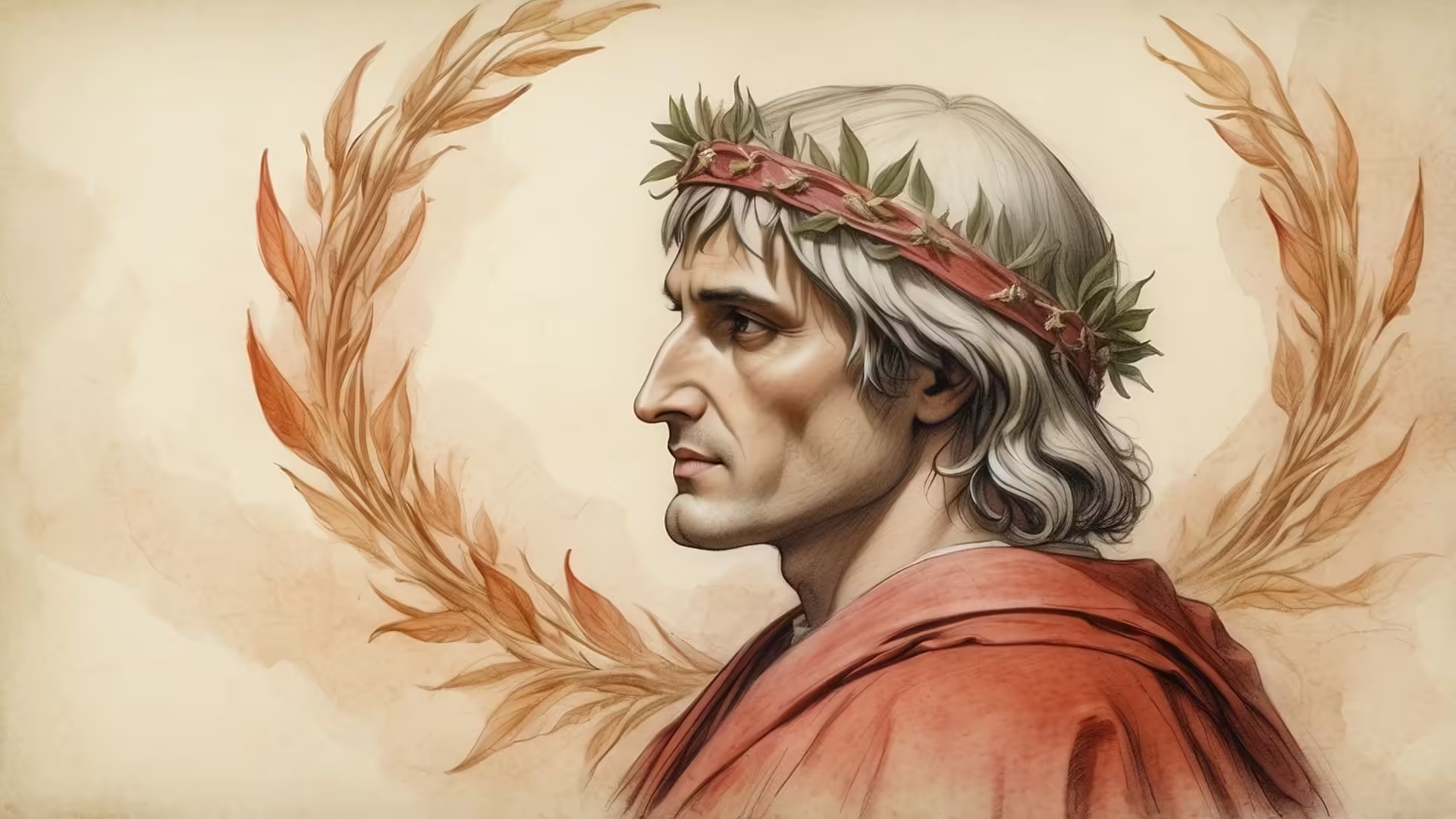The Gist
Who Was Dante Alighieri?
Dante Alighieri, born in 1265 in Florence, Italy, was more than just a poet—he was a thinker, politician, philosopher, and visionary. He lived in a turbulent time when Florence was divided between factions vying for power. Dante was deeply involved in these political struggles, which would eventually lead to his exile. Though forced to leave Florence, Dante used his personal pain and experiences to fuel his greatest work, The Divine Comedy, a literary masterpiece that remains influential to this day.
The Divine Comedy: A Journey Through the Afterlife
Dante’s Divine Comedy is an epic poem that takes readers on a symbolic journey through the three realms of the afterlife: Inferno (Hell), Purgatorio (Purgatory), and Paradiso (Paradise). In each section, Dante the character meets souls suffering, hoping, or rejoicing, while gaining deeper understanding about human nature and divine justice. Guided by the Roman poet Virgil and later by Beatrice—the love of his life—Dante’s journey is both personal and universal. It explores themes like redemption, morality, and the struggle between sin and virtue, offering timeless reflections on the human condition.
The Inferno is perhaps the most well-known part of the Divine Comedy. It presents Hell as a series of descending circles, each one punishing a specific sin in a way that reflects the nature of that wrongdoing. For example, liars and deceivers are condemned to wander in darkness, symbolizing the way lies distort the truth. Dante’s portrayal of Hell isn’t just terrifying—it’s also philosophical, making readers question what justice and punishment truly mean.
The Purgatorio and Paradiso sections take a more uplifting tone, focusing on personal growth and spiritual fulfillment. In Purgatory, souls strive to overcome their sins, while in Paradise, they experience divine love and harmony. Through these realms, Dante reflects on hope and the possibility of transformation, showing that even the darkest souls have a chance at redemption.
Love, Loss, and Exile
One of the most intriguing aspects of Dante’s life is his relationship with Beatrice Portinari, the woman who became his muse. Although they only met a few times, Dante’s love for Beatrice inspired much of his poetry, and she plays a central role in The Divine Comedy as his guide through Paradise. His love for her was spiritual, transcending the boundaries of earthly romance.
Exile shaped much of Dante’s later life and writing. Banished from Florence due to political conflict, Dante spent the rest of his life wandering Italy, longing to return home. His experience of exile gave him a unique perspective on human suffering and loss, themes that run throughout The Divine Comedy. Yet, despite his personal hardships, Dante’s work reflects hope and the belief that every journey, no matter how difficult, has meaning.
The Impact and Legacy of Dante Alighieri
Dante’s influence extends far beyond his lifetime. His work established Italian as a literary language, paving the way for future writers and poets. Before Dante, Latin was the dominant language of literature, but The Divine Comedy, written in Italian, proved that the vernacular could be just as powerful and poetic.
Dante also shaped how people view the afterlife. His vision of Hell, Purgatory, and Paradise has left a lasting mark on Western culture. From art and literature to films and pop culture, references to Dante’s Inferno are everywhere. His ability to blend philosophy, theology, and personal experience into one seamless narrative is what makes his work truly timeless.
Beyond literature, Dante’s ideas about justice, morality, and the nature of love continue to resonate today. His exploration of human flaws and potential for redemption reminds us that life is a journey—full of challenges, but also opportunities for growth and transformation.
Why Dante Still Matters Today
Dante Alighieri’s life and work remind us that the greatest stories are often born from personal struggle. Through exile, unfulfilled love, and political conflict, Dante created a literary masterpiece that continues to inspire people around the world. His journey through Hell, Purgatory, and Paradise isn’t just an exploration of the afterlife—it’s a reflection of our own human journey, filled with challenges, choices, and the hope for redemption. Dante’s story, like the Divine Comedy itself, teaches us that even in the darkest moments, there is always a path toward light and
Let’s Talk
Dante Alighieri’s story is one of those that sticks with you long after you put the book down, isn’t it? What gets me the most about Dante is how personal The Divine Comedy feels, even though it’s this grand epic about the afterlife. It’s not just about angels and demons or divine justice—it’s about Dante himself, working through his own doubts, regrets, and longings. And, honestly, who hasn’t felt a little lost at times, wandering through their own personal version of a dark forest? It makes you wonder: what’s your version of an “Inferno”—a tough challenge that felt like it might never end but taught you something important?
Dante’s love for Beatrice is another part that really fascinates me. I mean, they barely knew each other, yet she became the most important figure in his inner world. Isn’t it amazing how people, even fleeting connections, can leave such a lasting impression? We’ve all had that one person, haven’t we? The friend or mentor who, maybe without even realizing it, helped guide us toward something better—our personal “Paradise.” It makes you think about the people who shape your life, sometimes in ways you only understand much later.
And then there’s the theme of exile. Imagine being banned from your own home, knowing you’ll never return, but still carrying that place in your heart every day. It’s no wonder exile was such a major influence on Dante’s writing. Exile doesn’t have to mean being physically displaced, either. Have you ever felt like an outsider, like you didn’t quite belong? That’s a kind of exile too, and it can push you toward creativity, just like it did for Dante. It’s funny how sometimes the hardest things we go through end up inspiring the best parts of us.
What I love most about Dante’s work is how he mixes the grand with the personal. On one page, you’ve got these epic, cosmic ideas about justice and sin, and on the next, he’s reflecting on his own insecurities and hopes. It feels so real, even though we’re talking about a journey through Heaven and Hell. I think that’s why The Divine Comedy resonates so much—because we’ve all had moments where we question our choices, face our fears, and search for meaning in the chaos.
So, here’s a thought: What’s your personal “Inferno” or “Purgatory”—something you’re working through right now? And who are the Beatrices in your life, the people who’ve guided or inspired you, even from a distance? Maybe it’s worth reflecting on those moments and people a little more. After all, if Dante’s story teaches us anything, it’s that every journey, no matter how dark, leads somewhere meaningful if we’re willing to keep moving forward.
Let’s Learn Vocabulary in Context
Let’s take a closer look at some of the key vocabulary from Dante’s story and how they come to life beyond the pages of The Divine Comedy. First, there’s exile. In Dante’s case, exile meant being banished from Florence, never to return to the city he loved. But exile doesn’t have to be so dramatic in real life—it’s any situation where you feel removed or disconnected from a place or community. Maybe you’ve moved to a new city where you don’t know anyone, or you’ve felt out of place in a new job. Exile can be lonely, but it can also push us to grow in unexpected ways, just like it did for Dante.
Then we have Inferno. In Dante’s epic, the Inferno represents Hell—a place of torment and suffering. But if we’re honest, we all have our little “Infernos” from time to time. It could be that stressful work project that feels never-ending or a personal challenge that you can’t seem to escape. The key takeaway? Even the toughest situations have something to teach us, just like Dante learned about human nature in the depths of Hell.
Redemption is another powerful word from Dante’s journey. It’s all about second chances and the idea that no matter how lost someone feels, there’s always a way back to the light. We see redemption in real life all the time—when someone makes amends for past mistakes, or when we forgive ourselves and move forward. Have you ever had a moment where you thought, “I really messed up,” only to realize later that it led to something better? That’s redemption in action.
Let’s not forget Purgatory. In Dante’s Purgatory, souls work to overcome their sins and move toward a better state. In everyday life, purgatory is that in-between space where you’re working on yourself but haven’t quite reached your goal. Maybe you’re learning a new skill or rebuilding a relationship—it’s not easy, but you know it’s worth it. We’ve all been there, right? That space where progress feels slow, but you can sense that you’re on the right path.
Another important concept is legacy. Dante’s legacy is his poetry—especially The Divine Comedy, which has influenced literature, philosophy, and art for centuries. But legacy doesn’t have to mean creating something world-famous. Your legacy can be the impact you leave on people’s lives—through kindness, friendship, or the memories you create. What kind of legacy do you want to leave behind?
So, here are a couple of questions to think about: Have you ever gone through your own “Inferno” or “Purgatory,” and what did it teach you? And who are the people helping to guide you, like Beatrice did for Dante, even if they don’t realize it? These words remind us that life is a journey, full of ups and downs, but always moving toward meaning if we’re willing to embrace the path ahead.










0 Comments